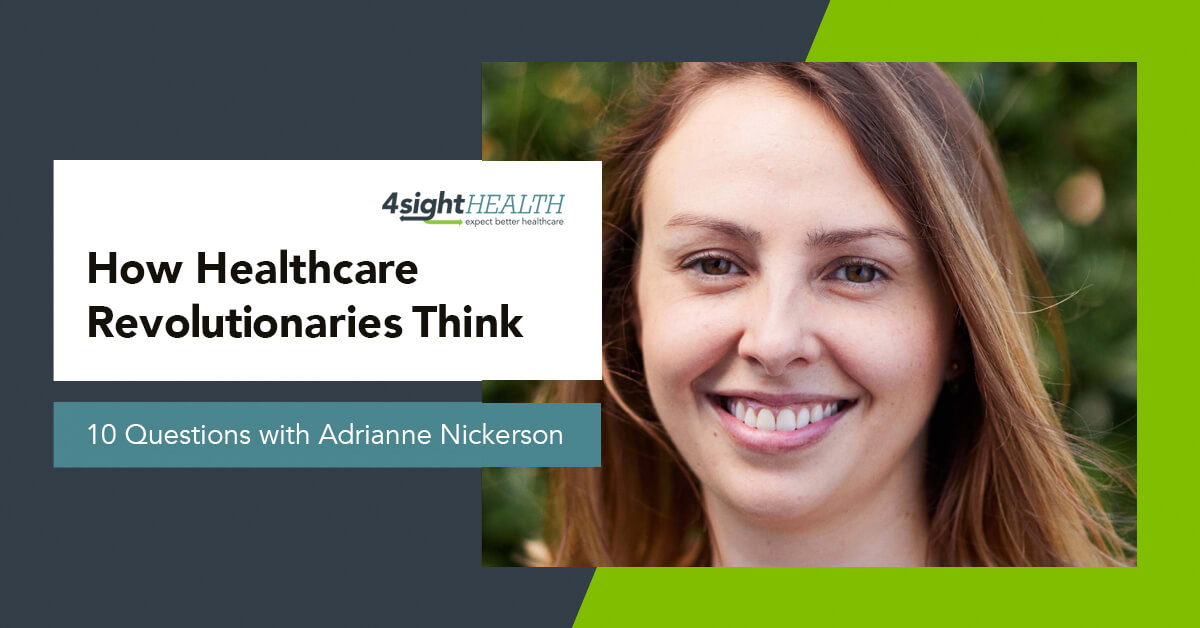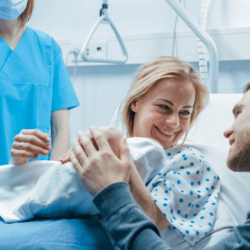March 15, 2022

How Healthcare Revolutionaries Think: 10 Questions with Adrianne Nickerson
Welcome to the latest installment of 4sight Health’s series, How Healthcare Revolutionaries Think. Our interview series profiles healthcare instigators who believe that outcomes matter, customers count and value rules.
I see maternity care for pregnant women through two lenses. First, as the father of three children who all were delivered at the same teaching hospital in downtown Chicago. Second, as the husband of a nursing professor who teaches obstetrical nursing at a suburban Chicago university. That’s why my interview with Adrianne Nickerson was so eye-opening. Nickerson is the co-founder and CEO of Oula, a New York-based, whole-person maternity care company that offers a personalized pregnancy experience to low-risk expectant mothers. Customers can choose between a doctor or a midwife, a hospital or a birthing center, pain medication or no pain meds, and other prenatal and postnatal service options. It’s all up to you. I spoke with Nickerson about her professional and personal journey that gave birth to her idea to create what she calls a “modern maternity center.”
1. Adrianne, how would you define a healthcare revolutionary?
Nickerson: To me, the term “revolutionary” at its core always feels like something that’s super dramatic. I don’t know if that’s necessarily a good thing or even possible in healthcare. But in context, I’d say being a revolutionary in healthcare is having a vision for how to improve care married with the ability to march forward and execute on that vision within the constraints of today’s healthcare system. It’s about having an idea and getting it done. It sounds simple, but that’s really hard to do in healthcare.
2. Who, past or present, fits your definition of a healthcare revolutionary?
 Nickerson: As an entrepreneur, it’s very tempting to pick a builder. Someone who’s built a really cool company because that’s the world that I live in every day. But I do have a background in public health, so I’m going to say Atul Gawande, M.D. I just love his work. He’s not a traditional person to pick in the sense that he’s a bit more of an academic. But he has this ability to communicate his vision and bring others along, and that’s just so important. He inspires the next generation of physicians, public health leaders and everyone who’s working to change the system. He’s a true change agent, and that’s what makes him a healthcare revolutionary.
Nickerson: As an entrepreneur, it’s very tempting to pick a builder. Someone who’s built a really cool company because that’s the world that I live in every day. But I do have a background in public health, so I’m going to say Atul Gawande, M.D. I just love his work. He’s not a traditional person to pick in the sense that he’s a bit more of an academic. But he has this ability to communicate his vision and bring others along, and that’s just so important. He inspires the next generation of physicians, public health leaders and everyone who’s working to change the system. He’s a true change agent, and that’s what makes him a healthcare revolutionary.
3. Do you consider yourself a healthcare revolutionary given your definition and pick of Dr. Gawande?
Nickerson: I think not yet. There’s a bit to me about the revolutionary piece that requires some solid scale to it. Not only do you have a vision and are marching to it, but you’re actually having an industry-wide impact. The hope for sure with what we’re doing at Oula is to get to that level. But we’re definitely not there yet. So, I don’t feel like I’m a healthcare revolutionary.
4. You’ve described yourself as an entrepreneur with a public health background. But you’re also a health technology expert and a patient advocate. Who’s Adrianne Nickerson in ranked order?
 Nickerson: Definitely entrepreneur first. Patient advocate second. Maybe public health third. And health tech expert fourth. I put entrepreneur first because I love what I do. I love getting up each and every day and figuring out how to solve business problems, how to design a better healthcare system for patients and how to create an experience that patients should have, not the experience they have now.
Nickerson: Definitely entrepreneur first. Patient advocate second. Maybe public health third. And health tech expert fourth. I put entrepreneur first because I love what I do. I love getting up each and every day and figuring out how to solve business problems, how to design a better healthcare system for patients and how to create an experience that patients should have, not the experience they have now.
5. Are you a born entrepreneur? Did you have a lemonade stand on the corner when you were a kid? Or is it something you had to learn?
Nickerson: When I was younger, I didn’t think of myself as an entrepreneur at all. It didn’t hit me until I quit a job that I really hated without another job to go to. For someone who didn’t come from financial means or resources, that was a tough decision. I thought of myself as risk adverse and always calculated in my career choices. When I took that leap – that was the first time saw myself differently. When you don’t have a job, starting a company no longer feels like a scary endeavor as it might if you have a job. Once I was in with both feet, it felt super natural to me. I think my past experience as a healthcare consultant helped. I developed a set of skills to help other companies solve their problems. Now I put the same set of skills to work to solve problems at my own company and for our patients.
6. In ranked order, you say you’re an entrepreneur, a patient advocate, a public health worker and a health technology expert. What are you best at? What do you still need to work on?
Nickerson: I feel like I’m probably best at being a patient advocate. That comes from working at Oula and the company I worked at before Oula, Robin Care, which is a platform for improving the oncology experience for patients with cancer. Both are focused on changing care delivery and creating a whole-person approach to care. I’m one of the many people in this country who thought they wanted to be a doctor but then realized that they should be nowhere near a patient in terms of actually delivering care. That was not the place for me, and patients everywhere have benefited from my decision. I’d say I’m second best at being an entrepreneur. I do really well with ambiguity. I do really well with change. I do really well with solving problems. I’m very comfortable in all those spaces. I’d say I’m the least best at being a health technology expert. Health technology is just so, so complicated.
7. You realized you wouldn’t be a good doctor, so you decided against medicine. Yet, there are others who thought they may be bad doctors but became one anyway. What’s the difference between them and you?
Nickerson: I may have said that incorrectly. I might have been an OK doctor. But I realized I wouldn’t be happy being a doctor. When I was in college, I worked for a plastic surgeon, and I did it because if you wanted to go to med school, you had to have some sort of experience showing that you cared about medicine on your CV. I couldn’t afford to do all the unpaid internships. The plastic surgeon was the only one who would pay me. I talked to him a lot about my interest in medicine, and he pointed out something to me that I thought was really interesting. He said that he felt that at the end of the day medicine was a trade. It wasn’t an intellectual pursuit. I love the problem-solving piece of things. I like to figure out how things come together and how to push things forward. If being a doctor in the healthcare system today means dealing with all these challenges like EHRs that don’t work or payment rules that delay treatment and stop you from delivering the type of care you want to give your patients, I don’t want to be that person. I want to be the person thinking through how to make the system work better for doctors and their patients. I could actually do more for patients not being a doctor.
8. Do you have a personal maternity story that you can share? And if so, how did that shape what you’re trying to do at Oula?
 Nickerson: I have a 9-month-old son, so I definitely have a personal maternity story. It just so happened that I was pregnant literally during the same timeframe that we were setting up Oula. We raised capital, hired a team and opened our first clinic in the time it took to have the baby. And I wasn’t the only one. It turned out that our co-founder / chief operating officer was pregnant, and our chief experience officer was pregnant. So we had three executives all pregnant at the same time, building a maternity company. It was wild. By going through it together we were able to share our individual experiences, trade notes and problem-solve each other’s situations. We had multiple voices at the table as we were building the company, and we all were connected in the most personal way to the overall problems in maternity care that we were trying to solve. It was game-changing for me and Oula as we got to see the jobs to be done through the different lens of different people. We were our own focus group.
Nickerson: I have a 9-month-old son, so I definitely have a personal maternity story. It just so happened that I was pregnant literally during the same timeframe that we were setting up Oula. We raised capital, hired a team and opened our first clinic in the time it took to have the baby. And I wasn’t the only one. It turned out that our co-founder / chief operating officer was pregnant, and our chief experience officer was pregnant. So we had three executives all pregnant at the same time, building a maternity company. It was wild. By going through it together we were able to share our individual experiences, trade notes and problem-solve each other’s situations. We had multiple voices at the table as we were building the company, and we all were connected in the most personal way to the overall problems in maternity care that we were trying to solve. It was game-changing for me and Oula as we got to see the jobs to be done through the different lens of different people. We were our own focus group.
9. Does the fact that Oula’s co-founder and CEO, co-founder and COO, and chief experience officer were pregnant at the same time, and all have babies about the same age give the company more credibility with customers? Than if a man opened the door when they walked in?
Nickerson: That’s a really good point. We opened our first clinic a year ago now, and for customers it’s a big bet to choose a start-up with your first pregnancy or even any pregnancy. Maybe you pick a start-up if you want your teeth whitened but not necessarily for the birth of your child, right? But I think the fact that the founders are eating their own dog food, so to speak, gives people comfort in choosing us. We picked this model of care for ourselves, and it means it’s safe for them to do so. It’s powerful, and it’s very much part of our brand story.
10. You ranked yourself as an entrepreneur first. I talk to a lot of people who call themselves serial entrepreneurs. Every three, four years they sell or leave their previous company to start a new one. Where are you five years from now?
Nickerson: I think I’m still at Oula in five years because I feel like this is the company that I was meant to build, and there’s so much more to be done. In five years, our job won’t be done yet. There are so many other places where we can expand. We also could expand Oula beyond pregnancy to other ways we can serve women and families better. I am passionate about this space.
Burda’s Final Bit
When you think about redesigning the healthcare system to make it work better for patients, it’s really about giving customers the power to choose the care model and the care setting that best meets their individual healthcare needs at that moment in their lives. Nickerson gets that. Oula isn’t for everyone. But it’s there as a choice for women with low-risk pregnancies who want a whole-person approach to maternity care. It’s about what the customer wants, as it should be.
Adrianne Nickerson, CEO of Oula Health
Adrianne Nickerson is CEO of Oula Health. Prior to Oula, she co-founded Robin Care, a virtual cancer care management company. Nickerson holds a Master’s in Global Health from Harvard where her research focused on barriers to accessing reproductive health services.
Read More Healthcare Revolutionary Interviews
- February 2022: David Snow
- January 2022: Kristen Valdes
- October 2021: Glen Tullman
- September 2021: David Greenberg and Dave Jacobs
- August 2021: Jeff Jones
- July 2021: Scott Powder
- June 2021: Robert Pearl, M.D.
- May 2021: Kurt Waltenbaugh
- April 2021: Jon Pearce
- March 2021: Thompson Aderinkomi
- February 2021: Gaurov Dayal, M.D.





